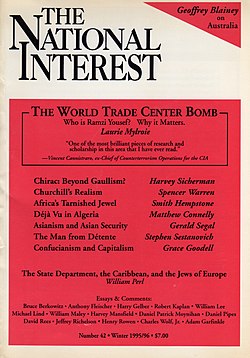Loading AI tools
American international affairs magazine From Wikipedia, the free encyclopedia
The National Interest (TNI) is an American bimonthly international relations magazine edited by American journalist Jacob Heilbrunn and published by the Center for the National Interest, a public policy think tank based in Washington, D.C., that was established by former U.S. President Richard Nixon in 1994 as the Nixon Center for Peace and Freedom. The magazine is associated with the realist school of international studies.[1]
 Winter 1995/96 cover | |
| Editor | Jacob Heilbrunn (since July 2013) |
|---|---|
| Categories | International affairs |
| Frequency | Bi-monthly |
| Founder | Irving Kristol |
| Founded | 1985 |
| First issue | 1985 |
| Company | National Affairs, Inc. (1985–2001) Center for the National Interest (2001–present) |
| Country | United States |
| Based in | Washington, D.C., U.S. |
| Website | nationalinterest |
| ISSN | 0884-9382 |
Founded in 1985 by American columnist and neoconservatism advocate Irving Kristol, the magazine was until 2001 edited by Australian academic Owen Harries.[1]
In 2001, The National Interest was acquired by The Center for the National Interest, a public policy think tank based in Washington, D.C., that was established by former U.S. President Richard Nixon on January 20, 1994, as the Nixon Center for Peace and Freedom.[2]
In 2005, ten editors of The National Interest resigned due to different viewpoints regarding the magazine's acquisition and with the larger editorial board. Those who left founded a separate journal, The American Interest.[3][4]
In 2013, RealClearWorld named The National Interest one of the Best World Opinion Websites.[5]
In January 2023, it shut down its print edition, which had dropped from 10,000 subscribers in the 1990s to around 2,000 subscribers.[6]
The National Interest is credited with introducing ideas like "the West and the rest" and geoeconomics into public discourse.[3] Political scientist Francis Fukuyama formulated his early political and philosophical thoughts on the end of history in the journal in 1989, where he argued that the worldwide spread of liberal democracies and free-market capitalism of the West and its lifestyle may signal the end point of humanity's sociocultural evolution and become the final form of human government.[7][8][9] In 2005, Fukuyama left to found The American Interest, citing what he saw as excessive international relations realism supported by the Nixon Center.[3][4]
Seamless Wikipedia browsing. On steroids.
Every time you click a link to Wikipedia, Wiktionary or Wikiquote in your browser's search results, it will show the modern Wikiwand interface.
Wikiwand extension is a five stars, simple, with minimum permission required to keep your browsing private, safe and transparent.